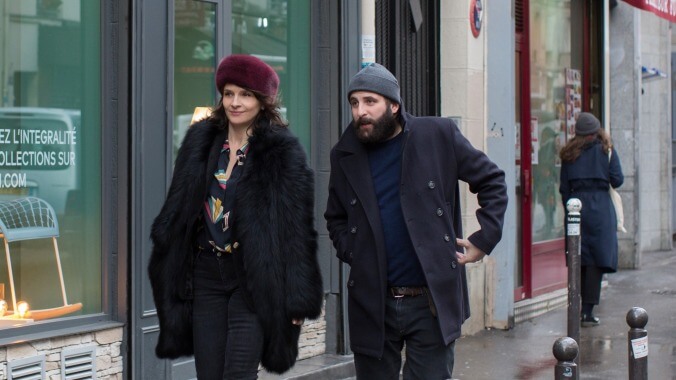The new novel (ominously titled Full Stop), which recounts the narrator’s steamy relationship with a woman named Xenia, is really a roman à clef about Léonard’s ongoing affair with Alain’s wife, Selena (Juliette Binoche). She’s a B-list actress, currently starring in a popular police procedural called Collusion. For once, Léonard may have hidden his tracks too well; his description of Xenia has left Alain with the mistaken impression that the book is based on an earlier fling that Léonard had with a trashy talk-show host named Stephanie Volkowski. And though Alain cites poor sales figures as the reason he doesn’t want to publish Full Stop, it seems that his gut-level dislike of this unseen character has played no small role. Of course, Alain’s obliviousness is no match for Léonard’s; the writer isn’t sure whether his wife, Valérie (Nora Hamzawi), knows about his serial cheating (even though it seems to be the main subject of his novels), and arrives at every reading and interview unprepared to answer questions about his personal life, even though it’s the only thing anyone ever asks him about.
Not that Assayas is setting up a major conflict in this who’s-sleeping-with-whom scenario. His characters—a cosmopolitan, bed-hopping species sometimes dismissively referred to as “the French”—aren’t that hung up on each other’s peccadilloes. Mostly, they want to harangue each other about the hot topics of the publishing business circa the late 2000s and early 2010s: Kindle readers, audiobooks, adult coloring books, blogs, the tweet as modern-day haiku, and the end of print. (Sample line: “Google has taken our entire literary memory hostage to sell user data to advertisers.”) The business and degradation of culture has long been one of Assayas’ favorite themes, going all the way back to Irma Vep. That deconstructive 1996 feature (which ironically became his international breakthrough) envisioned the moribund French film scene as a doomed remake of a classic silent serial, starring a foreign celebrity, directed by a fading star of the ’60s, with the general impression that the lunatics were running the asylum. His take on the world of the unhappy literati (also the subject of his underrated Irma Vep follow-up Late August, Early September) is all talk, susceptible to misinterpretation.
None of which counteracts the occasional feeling that the characters of Non-Fiction are essay points with legs. (The most obvious example is a tedious subplot that involves Alain’s affair with a twentysomething digital media strategist hired by his publishing house.) But Assayas’ blocking and constant repositioning of his winning cast remains as lively as ever; they have a habit of moving from one piece of furniture to another over the course of a conversation, just as the movie slinks from moments of intellectual cringe comedy (including a very good running gag about Michael Haneke’s The White Ribbon) to groaners. This is, in other words, Assayas’ homage to highbrow gabfests—the mid-period films of Woody Allen (complete with a Bergman reference) and especially the work of Éric Rohmer, the pseudonymous critic-turned-director who made a career of exploring his characters’ private dilemmas, but remained famously secretive about his own personal life. Somewhere under Non-Fiction’s awkward shuffling is a cautionary tale about reading between the lines.

